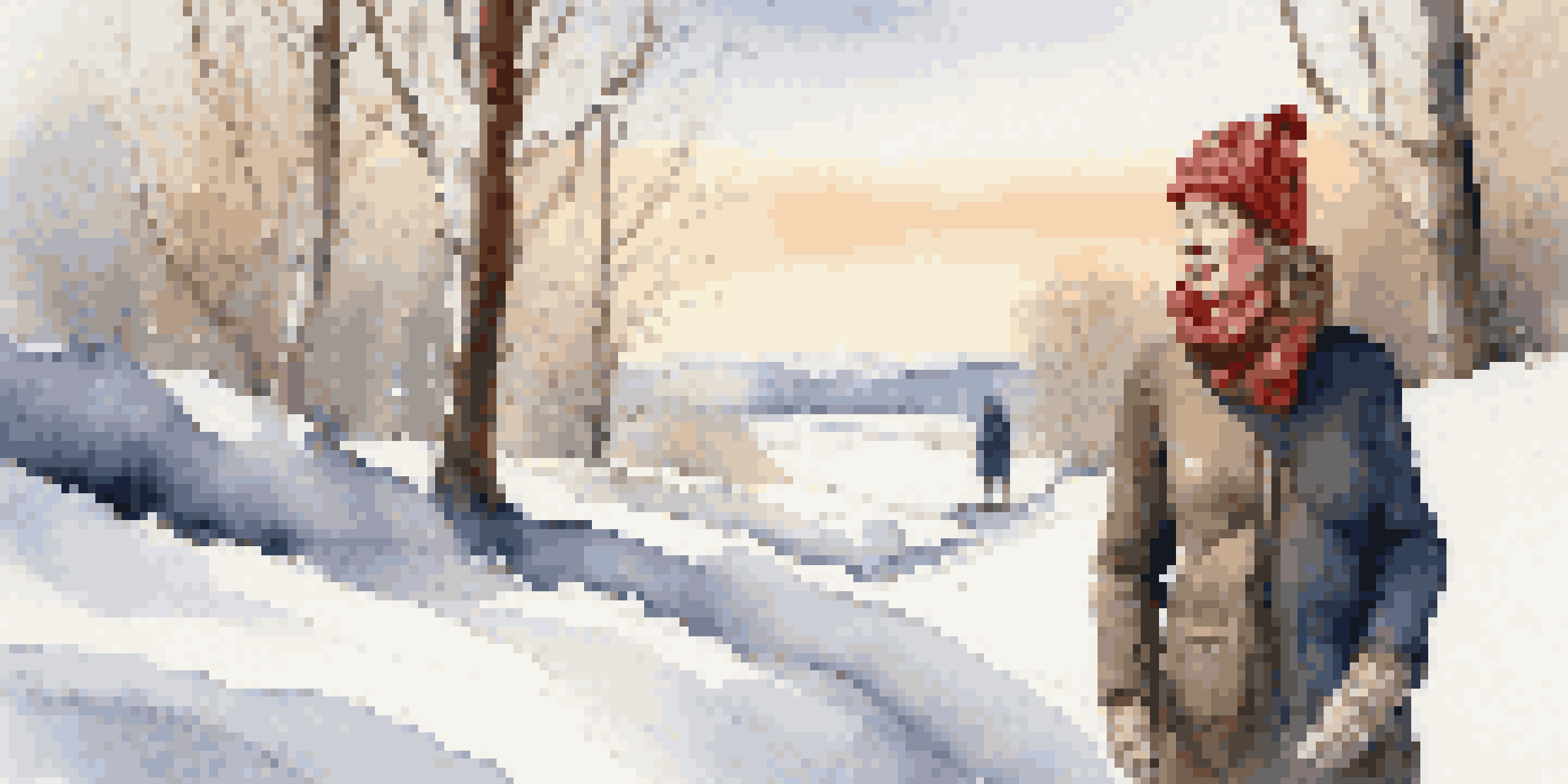How to Stay Warm and Healthy During Winter Travel

Dress in Layers for Ultimate Warmth and Comfort
When it comes to winter travel, layering your clothing is crucial. Start with a moisture-wicking base layer to keep sweat away from your skin, followed by insulating layers like fleece or wool. Finally, top it off with a waterproof and windproof outer layer to shield you from the elements.
In every walk with nature one receives far more than he seeks.
This strategy not only keeps you warm but also allows you to adjust your outfit based on changing temperatures. For example, if you’re moving from a chilly outdoor environment to a warm indoor space, you can easily remove a layer to stay comfortable. Remember, it's all about flexibility!
Don’t forget to accessorize! Hats, gloves, and scarves can make a significant difference in retaining body heat. Your extremities tend to lose warmth quickly, so ensuring they're bundled up will help you feel more comfortable throughout your travels.
Stay Hydrated and Nourished While Traveling
It might be tempting to indulge in hot beverages and heavy meals while traveling in winter, but staying hydrated is equally important. Cold weather can often mask your thirst, leading to dehydration. Carry a reusable water bottle and sip regularly to keep your body functioning at its best.

Additionally, focus on nutritious snacks like nuts, fruits, and granola bars that are easy to pack and provide energy. Foods rich in vitamins and minerals not only boost your immune system but also help combat the winter blues, keeping you feeling energized during your adventures.
Layer Up for Comfort and Warmth
Dressing in layers allows you to adjust easily to temperature changes while traveling in winter.
Avoiding excessive caffeine and sugar can also help you maintain a steady energy level. Instead, try herbal teas or warm soups, which can be both comforting and nourishing, making them perfect companions for your winter travels.
Protect Your Skin from Harsh Winter Elements
Winter air can be incredibly drying, and your skin needs extra care during this season. Start by using a good moisturizer daily to help create a barrier against the cold. Look for products that contain ingredients like hyaluronic acid or glycerin, which can provide hydration and hold moisture in your skin.
The journey of a thousand miles begins with one step.
Don’t forget about your lips! Chapped lips are a common issue in winter, so applying a nourishing lip balm can go a long way in preventing discomfort. Consider using a balm with SPF protection—yes, UV rays can still affect you in winter, especially if you're near snow.
Finally, consider using a humidifier in your hotel room or wherever you’re staying. This can help maintain moisture in the air, reducing the drying effects of heating systems and helping your skin stay supple and healthy throughout your trip.
Keep Active: Simple Exercises to Do Anywhere
Staying active during winter travel can be a challenge, but it's essential for both your physical and mental well-being. You don’t need to hit the gym; simple exercises like stretching, yoga, or even a brisk walk can make a significant difference. Try to set aside time each day for some movement, even if it’s just for 15-20 minutes.
If you’re in a hotel, utilize the stairs instead of the elevator, or explore your surroundings on foot to get your heart pumping. Engaging in physical activity can help counteract the sluggishness that often accompanies cold weather, keeping your spirits high.
Nutrition Fuels Winter Adventures
Staying hydrated and choosing nutritious snacks can help maintain your energy and immune health during winter travels.
Additionally, participating in winter activities like snowshoeing or skiing can be a fun way to stay fit while enjoying the beauty of the season. Just remember to dress appropriately and listen to your body to avoid overexertion.
Plan Your Itinerary with Indoor Options in Mind
When planning a winter trip, it’s wise to consider a mix of indoor and outdoor activities. While you might be excited about exploring snowy landscapes, having backup plans for indoor attractions can save the day if the weather takes a turn. Museums, galleries, and local cafés can offer warmth and a taste of local culture.
Look for events or festivals that take place indoors, as these can provide an enriching experience while keeping you cozy. Many cities have winter markets or seasonal events that showcase local crafts and foods, making for a delightful way to spend your time.
Balancing your schedule with both types of activities can also help you avoid the fatigue that comes from being outside in the cold for too long. Allow yourself some downtime to recharge and enjoy your surroundings at a comfortable pace.
Stay Informed About Weather Conditions
Keeping an eye on the weather forecast is essential when traveling in winter. Sudden changes in weather can affect your plans, from snowstorms to freezing temperatures. Use reliable weather apps to stay updated and adjust your itinerary accordingly.
Understanding the forecast can also help you pack appropriately. If a cold snap is expected, you might need to add extra layers or specific gear like thermal gloves and waterproof boots. Being prepared can make all the difference in enjoying your trip.
Plan for Indoor Activities Too
Including indoor options in your itinerary ensures you have cozy alternatives if outdoor conditions worsen.
Additionally, pay attention to local advisories and travel warnings. This information can help you avoid hazardous conditions and ensure a safer, more enjoyable experience during your winter travels.
Prioritize Sleep for Better Health on the Go
Traveling can disrupt your sleep patterns, but prioritizing rest is crucial for staying healthy during winter trips. Lack of sleep can weaken your immune system, making you more susceptible to illness. Try to maintain a consistent sleep schedule, even when you're away from home.
Create a restful environment wherever you are. This might mean bringing along items like a travel pillow, eye mask, or white noise machine to help you drift off. Make your sleeping area as comfortable as possible to promote better quality sleep.

Finally, avoid caffeine and heavy meals close to bedtime. Opt for light snacks and soothing herbal teas instead, which can help you relax and prepare for a good night's sleep, setting you up for an energized day of exploration ahead.